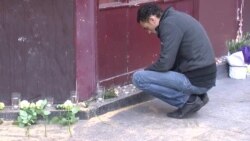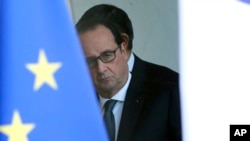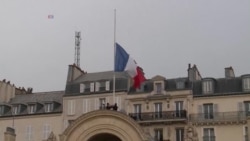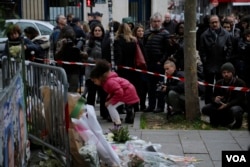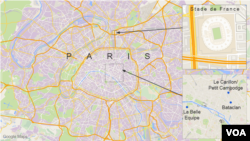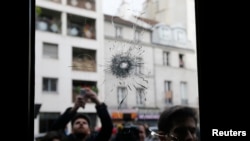France entered a second day of national mourning Sunday, following the bloodbath in Paris Friday night carried out by three teams of gunmen, some wearing suicide vests, at multiple locations. At least 129 people died in the rampage. Another 352 people were wounded in the killing spree, including 99 in critical condition.
French President Francois Hollande said the attacks, claimed by the Islamic State, amounted to an "act of war" against his country, and he feared terrorists may be planning more attacks.
In its claim of responsibility, Islamic State lashed out at the countries trying to suppress its attempt to establish a "caliphate" in Syria and Iraq, and said France remains "at the top" of its list of preferred targets.
IS message
An Islamic State message posted online Saturday said the Paris attacks were a response to the airstrikes the United States and its allies have been launching against its fighters in Iraq and Syria for more than a year.
Paris Prosecutor Francois Molins said the seven attackers died during the onslaught. One of the dead assailants has been identified as 29-year-old petty criminal Omar Ismail Mostefai. Molins said Mostefai had "never been implicated in an investigation or a terrorist association."
Six sites across Paris were attacked, including restaurants, a football (soccer) stadium, and a concert hall. While all known attackers were killed, it was not clear whether there might be more, or if accomplices are still lurking in Paris neighborhoods.
Video emerged Friday from the Bataclan concert hall where terrorists killed at least 89 people attending a rock concert. Police were seen caught in a gunbattle with some attackers, with several of the officers taking cover.
Other video taken with a cell phone in an alley behind Bataclan showed people pouring out a back exit door, some limping away wounded, others carrying bodies and the wounded. Screams could be distinctly heard.
Police were seen caught in a gunbattle with some of the terrorists, with several of the officers taking cover.
The other pictures were taken with a cellphone in an alley behind the concert hall. People could be seen pouring out of a back exit, some limping away wounded, others carrying bodies and the injured. Screams were audible.
Multiple attacks
Six sites across Paris were attacked, including restaurants and a football stadium. Seven terrorists, working in teams, were killed, but it was not clear whether there might be more.
A French counterterrorism official said authorities were still trying to find out whether the attackers who died in the assault were French residents and whether they had accomplices still waiting to strike. Security was stepped up to guard against further violence.
The Paris Attacks
The Paris Attacks
Terrorists with the Islamic State group orchestrated six deadly attacks on Paris late Friday, Nov. 13, leaving carnage, anger and opponents’ vows for justice in their wake. As of Saturday evening:
- At least 129 people killed, including 1 American
- 352 hurt, including 99 in critical condition
- 7 terrorists killed; they’d operated in 3 teams
- 1,500 additional French security forces called up
- Investigation expands to Belgium
The White House said President Barack Obama huddled with his national security team Saturday before leaving for the G-20 summit in Turkey.
It said Obama and his aides had seen no intelligence contradicting French assertions that the Islamic State group was behind the Paris attacks. There was no specific threat to the United States at this time, officials said.
Also Saturday, police in Belgium arrested several people during raids in a Brussels neighborhood. The Belgian prosecutor's office said a car rented in Belgium was found near the Batcalan concert hall in Paris, where gunmen massacred audience members during a rock show.
And in Washington, the Pentagon said a senior IS leader had been killed in an airstrike Friday in Libya. Abu Nabil, also known as Wissam Najm Abd Zayd al Zubaydi, was an Iraqi national and longtime al-Qaida operative. Pentagon spokesman Peter Cook said the action "demonstrates we will go after ISIL leaders wherever they operate."
France singled out
In its claim of responsibility, Islamic State lashed out at countries fighting its attempt to establish a caliphate in Syria and Iraq.
An IS message posted online Saturday said the Paris attacks were a response to the airstrikes the United States and its allies have been launching against its fighters in Iraq and Syria for more than a year. The message said France and its supporters "will remain at the top of the list of targets of the Islamic State."
WATCH: Related video of world showing support for Paris victims
The claim of responsibility appeared in Arabic and French. It was not immediately possible to confirm its authenticity, but terrorism experts did not dispute the claim's validity.
"The stench of death will not leave their noses," IS said of France's leaders, "as long as they remain at the forefront of the Crusaders' campaign, dare to curse our prophet, boast of a war with Islam in France, and strike Muslims in the lands of the caliphate with warplanes that were of no use to them in the streets and rotten alleys of Paris."
'Triumph over this barbarity'
People across France woke up Saturday to a nationwide state of emergency. Hollande, who called off his trip to Turkey for the G-20 meeting, asked Paris residents to stay inside Saturday, and he declared three days of national mourning.
Vowing to hunt down the attackers, Hollande said, "France will triumph over this barbarity." He called an emergency Cabinet meeting and mobilized France's security forces at the "highest levels."
Hollande also ordered France's borders closed — an unprecedented act in 21st-century Europe. However, the main airport remained open and trains were still running.
Memorials across Paris
Along with French citizens, those killed in Friday's attacks included people from Belgium, Tunisia, Britain, Portugal, Romania, Spain and Sweden. A 23-year-old U.S. student from California was also killed.
Flowers, candles and notes were strewn in front of Le Carillon bar and Le Petit Cambodge restaurant, where gunmen killed at least a dozen people. Both are popular spots located near the Saint Martin canal in northern Paris. On Saturday evening, a vigil was held at Place de la Republique.
Such acts of solidarity were taking place around the city. Friday's assault evoked memories of an attack by Islamist gunmen in January that killed 17 people, including staff members of the satirical weekly Charlie Hebdo.
Paris Prosecutor Francois Molins said Friday's attacks seemed to involve three teams of gunmen, several who wore suicide vests.
Molins said three attackers died — one shot by police and two when their suicide vests exploded — at the Bataclan concert hall.
Authorities said Saturday that the blasts that shook the Stade de France marked the moments when three suicide bombers detonated explosives stuffed into their clothing. Police evacuated Hollande from the stadium.
U.S. officials said the embassy in France has been checking on the safety of all Americans in Paris.
In a letter to Hollande, European Council President Donald Tusk said, "We will ensure that the tragic, shameful act of terrorism against Paris fails in its purpose: to divide, to frighten, and to undermine liberty, equality and fraternity, the values that make France a great nation."
Britain's Prime Minister David Cameron, in remarks Saturday, said, "It is clear that the threat from ISIL is evolving" and that, despite high security, he and his countrymen "must be prepared for a number of British casualties."
At the United Nations, a spokesman said Secretary-General Ban Ki-moon "condemns the despicable terrorist attacks."
Paris is due to host a major U.N.-sponsored conference beginning November 30 on the international effort to control global warming.
VOA White House Correspondent Aru Pande, National Security Correspondent Jeff Seldin, Luis Ramirez, Lisa Bryant from Paris, and Jamie Dettmer contributed to this report.




